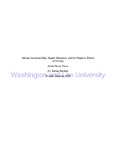| dc.rights.license | In Copyright | en_US |
| dc.creator | Davis, Aisha N. | |
| dc.date.accessioned | 2013-12-03T13:29:42Z | |
| dc.date.available | 2013-12-03T13:29:42Z | |
| dc.date.created | 2009 | |
| dc.identifier | WLURG38_Davis_POV_2009_wm | |
| dc.identifier.uri | http://hdl.handle.net/11021/24179 | |
| dc.description | Capstone; [FULL-TEXT FREELY AVAILABLE ONLINE] | en_US |
| dc.description | Aisha N. Davis is a member of the Class of 2009 of Washington and Lee University. | en_US |
| dc.description.abstract | In the pursuit of fiscal stability, many Americans seek degrees that would qualify them for positions that would allow for a certain level of comfort in the future. By striving to attain this monetary success, different groups within the American population have moved their way up the socioeconomic ladder, but this does not hold true for African-Americans. More specifically, in terms of education, African-American men are not achieving on the same level as their White counterparts. This trend not only leaves African-American men without the opportunity for much upward mobility, it also serves as an obstacle for the advancement of the African-American community as a whole. . . . the numbers still illustrate a discouraging trend in the education of African-American men. There are numerous obstacles weighing down the potential of African-American men, and the results of these obstacles are a pattern of poverty and incarceration as opposed to graduation. In addition to this painful trend, there are more African-American men incarcerated than any other group of men in America, leading to the growth in the number of single-parent homes and unwed African-American mothers. The trend of low college enrollment is tied into all of these issues, and many more that have led African-American men to be the least represented demographic in colleges and universities around the nation. [From Introduction] | en_US |
| dc.description.statementofresponsibility | Aisha Nicole Davis | |
| dc.format.extent | 34 pages | en_US |
| dc.language.iso | en_US | en_US |
| dc.rights | This material is made available for use in research, teaching, and private study, pursuant to U.S. Copyright law. The user assumes full responsibility for any use of the materials, including but not limited to, infringement of copyright and publication rights of reproduced materials. Any materials used should be fully credited with the source. | en_US |
| dc.rights.uri | http://rightsstatements.org/vocab/InC/1.0/ | en_US |
| dc.subject.other | Washington and Lee University, Shepherd Poverty Program | en_US |
| dc.title | African-American Men, Higher Education, and the Negative Effects of Poverty | en_US |
| dc.type | Text | en_US |
| dcterms.isPartOf | RG38 - Student Papers | |
| dc.rights.holder | Davis, Aisha N. | |
| dc.subject.fast | Poverty | en_US |
| dc.subject.fast | African American men -- Education (Higher) | en_US |
| dc.subject.fast | Discrimination in higher education | en_US |
| dc.subject.fast | De facto school segregation | en_US |
| local.department | Shepherd Poverty Program | en_US |
| local.scholarshiptype | Capstone | en_US |
